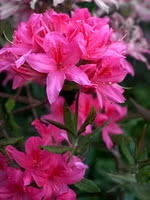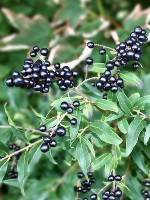Mon-Fri 9am - 5pm Mountain time
Rosy Lights Rhododendron (Azalea) vs Wild Privet
Rhododendron x Rosy Lights
Ligustrum vulgare
CUSTOM GROW
NOT AVAILABLE THIS SEASON - MIGHT RETURN
Rosy Lights Rhododendron is the next flowering, deciduous shrub you need in your garden. It is incredibly cold hardy and produces fragrant, bright pink blooms in late spring. Pruning is recommended after the flowers are finished to control the size and shape of this shrub.
Try Rosy Lights Rhododendron when planning your next hedge/screen, or plant it on its own as a striking accent plant. Part of the Northern Lights Series.
Wild Privet is a fast growing ornamental shrub that is well suited for forming hedges and privacy screens. It will retain its leaves in warmer climates but drops them in colder areas. They have small white flowers, though the smell is often considered unpleasant. While the berries are inedible, they are a good food source for many bird species.
It is recommended to prune Wild Privet immediately after flowering, as it can readily self seed. It is deer and rabbit tolerant. It can grow in dry areas, on slopes, and withstand the wind making it well suited for many growing conditions.
Rosy Lights Rhododendron (Azalea) Quick Facts
Wild Privet Quick Facts
Toxicity: All parts of a rhododendron bush, including the leaves, stems and blooms, are toxic to cats, dogs, and horses.
Toxicity: If ingested, all parts of this plant will cause severe discomfort. Toxic to dogs, cats, and horses

